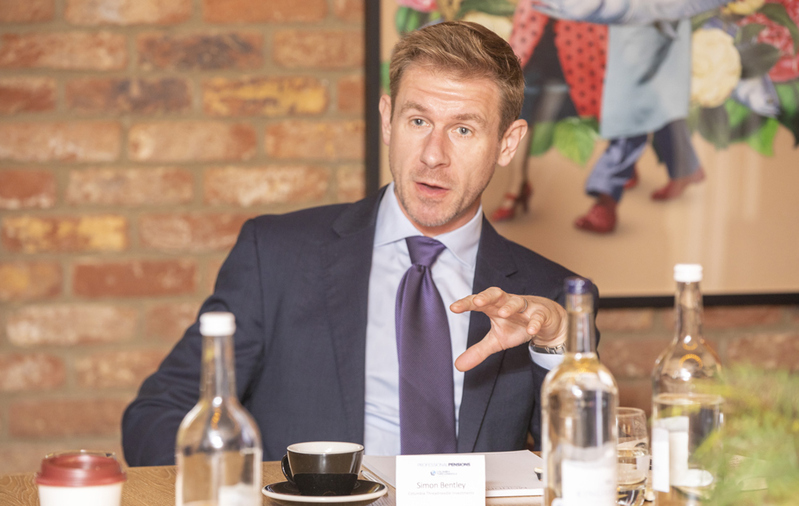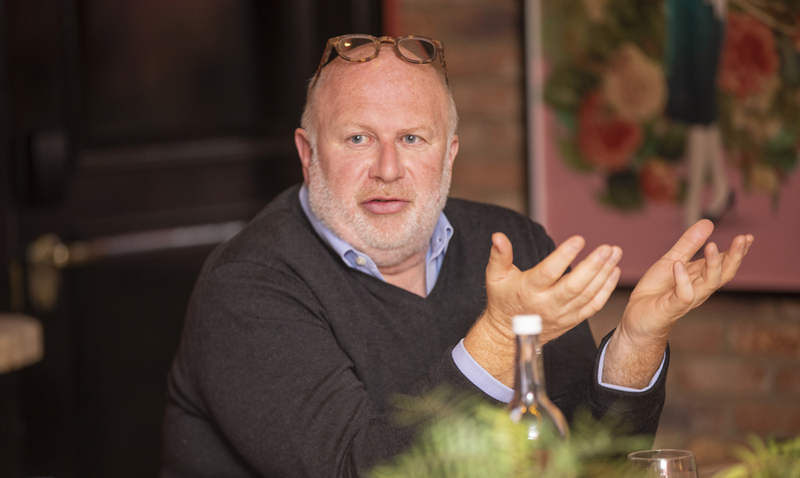
The panellists were (left to right) Columbia Threadneedle Investments head of UK LDI client portfolio management Simon Bentley, 20-20 Trustees trustee director Martin Collins, Columbia Threadneedle Investments UK institutional business director James Edwards, Punter Southall Governance Services client director Sophia Harrison, Zedra client director Alan Greenlees, Capital Cranfield professional trustee Mark Hedges, BESTrustees president Alan Pickering, Professional Pensions editor Jonathan Stapleton (chair) and BESTrustees trustee executive Andrew Cole
At the beginning of November last year, Professional Pensions assembled a panel of experts to discuss the fallout for pension schemes from September’s Mini Budget.
The roundtable - chaired by PP editor Jonathan Stapleton and held in association with Columbia Threadneedle Investments - looked at how the gilts sell-off at the end of September and the subsequent Bank of England intervention in the market marked a fundamental change in pension scheme investment strategies, with funds now re-evaluating their liability-driven investment (LDI) strategies and assessing broader changes in their allocations.
What has happened in the market since the mini budget and the market events that followed, and what should schemes be doing or thinking about next?
Martin Collins: It has been toughest for the schemes that were well-hedged and closer to endgame and the smaller schemes where arrangements tend to be less flexible. Generally, it has been hard if you did not use fiduciary management because the traditional model of working with consultants made it pretty tough to do things quickly. You discover the limits of how quickly you can move money around.
Andrew Cole: One of the challenges is that lay trustees have not fully understood the leverage embedded within their portfolios. Pension schemes have been sold LDI as the panacea of hedging, which works well when interest rates tend to zero or go below zero but does not work so well when markets move the other way around.
As always happens in any crisis, it becomes a liquidity crisis. And it was a real challenge for schemes to realise enough cash to pay collateral calls. There have also been issues in the underlying investment portfolio because sometimes people have to sell things quickly. If you have a high proportion of illiquid assets, that creates yet another problem.
Alan Pickering: I was very impressed by how some lay trustees jumped to it and realised trusteeship is not a once-a-quarter event any more. Many of them have been willing to clock on at 7.30 in the morning and clock off at 7.30 at night. In some ways, lay trustees who have project management skills as part of their day job were best at this because it was an operational, as much as a technical, challenge.
What has the asset manager experience been since the mini budget, and how have you been working with your clients?
Simon Bentley: The challenge was one of operational complexity, speed, and liquidity. The market movements were so unprecedented that whatever model you had in place was put under pressure because you needed to move money around the same day, the next day, or in two days' time.

James Edwards: We need to bear in mind the scale and speed of how quickly things evolved. The real yield on the 20-year gilt went from minus-two to zero over the nine months before Kwasi Kwarteng announced his mini budget and then did the same again over the next three days. If the same thing had happened in equity markets, the circuit breakers would have kicked in. The market would have been closed to allow people to catch up and process the volume of stuff that was going through. It really stretched the entire system to get through that sheer volume of work.
Sophia Harrison: Fiduciaries tend to run a more complex asset portfolio because of the governance arrangements, and the market event really tested the definition of what was a liquid asset. Notice periods for redemptions of each investment are not often thought about, but they came to the fore because they were an important aspect of making collateral calls. Some schemes, even with fiduciary managers, ended up with this quite skewed barbell portfolio of LDI plus some private markets and maybe some hedge funds and insurance-linked assets, where they could not liquidate those in time.
Alan Greenless: It was great to see the trustees, advisers, and LDI managers, working proactively and pragmatically at very short notice. It was encouraging, given the pensions industry is generally not known for its speed and reacting to challenges at short notice. Traditionally, it is seen as a bit of an oil tanker when it has to make decisions very quickly and bring about wholesale change.
What were the key lessons from the Mini Budget market event, and which processes should be revisited?
Andrew Cole: In any crisis, information is key. Although managers and investment advisers tried to pass on information as quickly as possible, the reality was there was sometimes miscommunication and a lack of real knowledge of what assets we had within schemes.
Asset managers have to mark their portfolios every night. It may be challenging when you are in an environment with lots of illiquidity, and they are undoubtedly working incredibly hard. But that information does not flow through to pension schemes. The frustration was not knowing exactly what we had when moving forward.
Alan Pickering: As a Yorkshireman, I hate spending money - mine or anybody else's - and one area where trustees have often saved money is not passing the investment management agreement (IMA) to their lawyers. Had we gone to the lawyers when we took out these IMAs, we might not have been able to change them, but we would have been aware of what somebody could do in particular circumstances. It shocked many trustees when they found out what their subcontractors were able to do and what they tried to do, even if they were not legally able to do it.
Simon Bentley: One lesson from this market event was the role of leverage. It is easy to understand leverage needs to come down. You do not need to reinvent your model to come up with that answer. If I go back six months or so, the previous headroom in portfolios was sufficient to withstand all the worst-case scenarios that we had ever seen, plus a little bit more. But with new scenarios that we can build since the Mini Budget market event, you get a different answer, resulting in lower leverage and therefore more headroom, reducing the likelihood of getting to the point where you have to reduce exposure.
Sophia Harrison: It has highlighted the importance of trustees understanding what they hold in their portfolios and the liquidity requirements of those assets. Consultants sometimes felt emotionally responsible for advising schemes to go into LDI and were then uncomfortable talking about the impact of rate rises. I am concerned that we may not have ridden the storm. We could still be in the eye of the storm with a lot of potential volatility to come.
But LDI managers have done a great job of reacting quickly to increased collateral buffers and managing risk that way. If there is going to be another volatility wave to ride, schemes are in a much better position. Certainly, they understand how they are going to be able to meet potential collateral payments, or hopefully, perhaps, collateral calls will be less frequent.
Andrew Cole: We may well be in the eye of the storm, and we need to be a bit more robust in terms of some of our decisions and thoughts, and kick the tyres harder than we have done in the past. That is probably the biggest issue. Not to take what our advisers are saying verbatim, because some of the advice has been horribly wrong. Therefore, there will be some changes once the dust settles, and we can take a bit more of a considered view of what has happened.

Did schemes, generally, get through the Mini Budget market event okay?
Martin Collins: Not everybody did. The worst-affected schemes were forced out of hedges at the worst possible time after gilt yields spiked. Not everyone wants to talk about that, but some were quite impacted.
Alan Greenlees: The majority of pension schemes have come through the other side in robust financial health. Yes, there are things we need to look at in terms of governance and how LDI managers and advisers communicate in the future. But, generally speaking, the main stakeholders did a remarkably good job safeguarding their schemes.
A key message will be that you cannot have your cake and eat it anymore when it comes to risk / return trade-off in your strategy. It will also be interesting to see how the illiquid asset market evolves. I would not say it is the final death knell for truly illiquid assets in DB, but it is difficult to justify and advise more allocation to those in the current climate.
Alan Pickering: The Work and Pensions Committee has asked The Pensions Regulator to opine on LDI, but the last thing we want is for the latter to regulate investment products or strategies.
There is a real danger that the kneejerk reaction to this crisis will have the unintended consequences that previous kneejerk reactions have caused. Pension Freedoms were far worse than the annuity hegemony it was meant to unlock. I would hate for us to say to the pensions regulator, ‘Tell us what to do'. The danger is that prescription will lead to unintended consequences and staunch innovation.
Mark Hedges: Investment products are highly regulated anyway, so more regulation would not be a good thing at all. The challenge is where we go from here. I suspect there will be a rebalancing of what portfolios look like. They will still want a big chunk of matching assets to manage liabilities but will need some cashflow to close that gap and generate some return.
Scheme allocations now look quite different from those at the beginning of September, but what will scheme asset allocation likely look like going forward?
James Edwards: For small schemes, we are moving back to a slightly simpler time. If funding levels have improved materially, that timeframe to getting a buyout done may have arrived. You want an eye on where you want to be in five years' time rather than what you need to do today.
We have had the mother of all fire drills. The big question we have as managers is can we move from third gear into fifth gear, sixth gear, and seventh gear at the drop of a hat again?
Simon Bentley: The endgame portfolio is probably a combination of unlevered LDI and short-dated, very liquid credit. Leverage is only there in as much as you need an excess return.
There always used to be more schemes wanting to go to an insurer, but a reasonable cohort still wanted self-sufficiency. The recent crisis, extra workload, and risk around trustee activity will make people think twice. Demand for insurance outcomes will pick up, and liquidity is absolutely key to that.
Mark Hedges: Part of the problem with illiquid assets is that private markets do not revalue in the same way. Suddenly, the net asset value of your exposure has gone up. If you had a 20% allocation then it is probably a 40% allocation now because everything else has come down. You never really know what its value is. You are reliant on manager information that comes out three months in arrears.
Sophia Harrison: Something that has cropped up a lot since the Mini Budget is that people are saying, ‘We might almost be at buyout', or, ‘If funding levels improve further, let's buyout.' But that ‘let's buyout' process is actually very long.
If schemes are well-funded and can look at buyout, there will be a long queue to transact. The larger schemes, where the insurance company makes bigger profits , will be prioritised. Small schemes may have to consider alternatives such as continuing on a self-sufficient basis until they are able to transact.

Martin Collins: There is a danger of a knee-jerk reaction against LDI. Now that yields are so much higher and scheme funding levels have improved, it could be a long time before smaller schemes can get into a buyout situation, even if they are fully funded. This is the best time ever to be using LDI. We have got to fix it, but people should not be moving away from LDI.
Mark Hedges: LDI is not a problem because it matches your liabilities and removes risks from interest rates and inflation to your liability position. The issue was that some positions were over-levered. Crises are often caused by over-leverage.
Sophia Harrison: Historically, leverage and fees were the two main areas of focus for an LDI manager selection exercise. The approach will be very different going forwards, and it is not going to be ‘Where can I get the greatest amount of leverage?'.
Is there room for schemes to take off some hedging, or is using LDI to remove risk still a sound strategy?
Alan Greenlees: There still remains a lot of concern among lay trustees about inflation risk and recession risk. And because of that, there is hesitancy to reduce the level of hedging in place despite concerns that interest rates could go up more than expected.
Martin Collins: Some schemes will reduce hedging for different reasons. If you were 100% hedged, the work you have to do to de-lever the portfolio means you do not have enough growth assets.
James Edwards: If every pension scheme out there today was 100% funded on whatever basis you choose to use, what would you invest in? It would be low-risk gilts with no leverage and a bit of credit to cover the cost of running the scheme. If gilt yields go higher, that is a good thing for the industry overall if they do so in a relatively orderly way.
We have to remember the introduction of leverage was a pragmatic approach balancing the need for sponsor contributions, minimising deficit volatility on the sponsor balance sheet and seeking investment returns.
Martin Collins: The reality is you never know which way markets are going. The easiest criticism some could have made of our industry is, ‘Look at how much money you lost on all those gilts', because we have lost hundreds of billions, but the point was locking in funding levels. And it has worked.
Mark Hedges: You do not buy gilts and linkers as a pension fund to make money. You buy them to hedge risk. We are not traders, we are long-term investors, and we manage risk more than investment, to some extent.
James Edwards: Leverage is transforming the deficit volatility into an operational risk you hope you have more control over.
Andrew Cole: The job of the trustee is to manage risk. If you take leverage out of the equation by default, you have more risk. I am concerned we will move back to taking more market and asset-related views to manage the deficit.
What do cash-like illiquid assets look like now?
Mark Hedges: If you are still going to hold illiquid assets, you are moving more into private credit, which is throwing off quarterly payment streams at higher levels than corporate bonds. They are probably more in line with high-yield bonds but are arguably a better credit risk, given they are typically secured. You would use private credit as your illiquid alternative if you need to generate returns over and above what you might get from gilts and corporate bond-type portfolios.
Andrew Cole: The difficulty with that is a lot of private credit schemes are effectively giving a fixed return because they are getting assets yielding 8% or 10%. As rates rise, that return above gilts diminishes because you have a fixed rate return.
Is there going to be a particular move towards a single governance model? Are there many schemes that will change or tweak governance models?
Simon Bentley: There are some areas for improvement and risks that trustees may want to reassign elsewhere. But much of that will be down to personal preference, expertise within individual trustee boards, and the quantity of governance budget those trustee groups have. There will not be a one-size-fits-all approach.
This roundtable was held on 1 November 2022 in association with Columbia Threadneedle Investments






